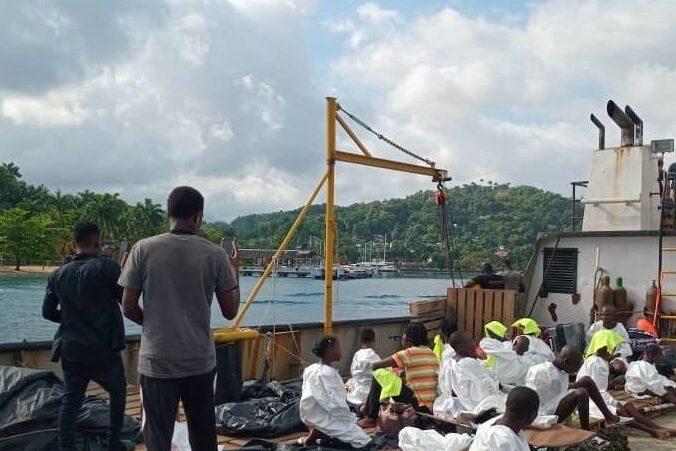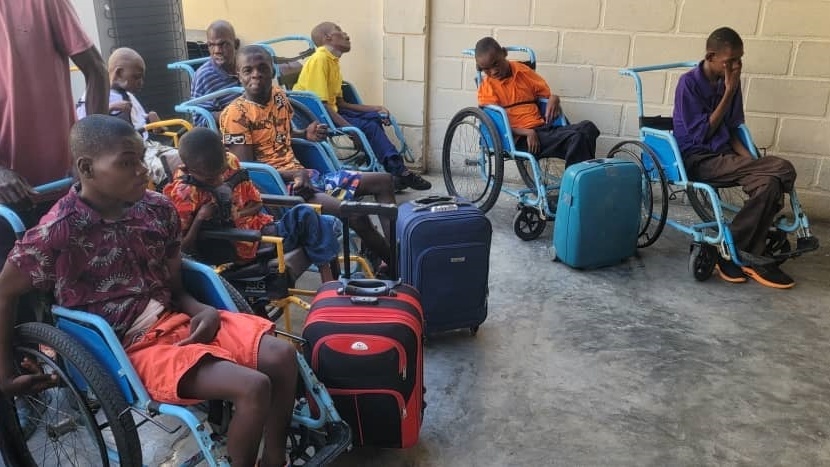
Dozens of Haitian orphans with disabilities, displaced by chaos and gang violence that has ravaged their country, are settling into a haven in Jamaica after a long campaign by the head of a Colorado nonprofit.
Susie Krabacher is CEO of the nonprofit HaitiChildren, which operates an orphanage outside Haiti’s capital, Port-au-Prince. She engineered the evacuation of 59 orphanage residents and 13 caretakers, who arrived in Jamaica on March 21 after a 36-hour boat ride.
As they disembarked "the ones that could walk ran to me, the ones that couldn't were crawling to me,” Krabacher said recently. “It was a memory I'll go to my grave with, that wonderful memory."
Krabacher founded her organization 30 years ago to serve disabled Haitian children who are often abandoned by their families and shunned by their communities.
“We have been assigned permanent care of these kids because of their disabilities, both mental and physical,” she said. “A lot of times in Haiti, children are born without any physician or prenatal or birthing care, so we have a lot of spinal cord issues. We have cerebral palsy … AIDS, and a lot of children who use wheelchairs. A lot of times those children will spend the rest of their lives with us growing up as a family because they cannot live independently.”
Other children, she said, arrive at the orphanage sick but recover and leave when they’re ready.
Over the years, HaitiChildren’s complex, located about 40 miles northwest of Port-au-Prince, had grown to include schools, medical services, and food distribution for the nearby community. But most of those projects collapsed as villagers fled the gangs that now control much of the country.
“I would say out of 10,000 people, there might be a dozen people left in that village, either slaughtered or they've run for their lives. Our kids can’t run, we can’t leave. There’s no place to go.” she said.
As gangs battled for control of the region “we were sitting ducks. We had been raided twice in the middle of the night. The kids were pulled out of their beds, thrown on the floor. They came and took all of the stuff in our warehouse – anything that was valuable. They took all of our food, turned around, and shouted to our orphanage director ‘If you don't put those kids out of their misery, we will.’ ”
Fearing for her own safety, Krabacher made her last trip to Haiti 14 months ago. From her home in Aspen, she pleaded with the Haitian government to let the orphans go, but officials resisted, saying the children could still be cared for in their native country.
“To which I answered, ‘I wouldn't be asking permission to leave if there was availability of medical care and medical specialists for my very special-needs children,’ ” she said.
Eventually, the government relented, but the challenges continued. Krabacher had to find a place for the orphans to go, and then get them out of Haiti safely.

In her early days in Haiti, Krabacher had worked with the operators of another orphanage, Mustard Seed Communities. That group moved to Jamaica several years ago but when Krabacher asked for help they offered the Haitians space.
For help with the evacuation, she reached out to an acquaintance – former Denver Broncos quarterback Tim Tebow, who has his own children’s foundation. Tebow, in turn, put her in touch with an organization called the Sentinel Foundation, staffed largely by former military special operations forces who combat child trafficking and offer crisis services around the world.
The Sentinel operatives went to Haiti, arrived at the orphanage, and got the children packed and on a bus. But the gangs pounced – holding the group hostage until they produced $2,000 they’d stowed in the bus. In Jamaica, Krabacher and her team heard nothing for six hours, until one of the orphans called from a beach to say they were about to board their rescue boat.
“We call it our D-Day,” Krabacher said.
She met the orphans as they disembarked and spent the next few weeks helping them get settled in with Mustard Seed. “I’m thrilled that I just got home from spending a great deal of time with them … and they’re happy,” she said.
“We will continue to care for them on the property of Mustard Seed for as long as they allow us to stay. I hope that'll be a long time. If not, then we'll get a house of our own in Jamaica and we'll continue as always, without the gunfire and without the corruption and the horror that these kids had to endure.”
But the fight isn’t over. While the Haitian government let the 59 orphans leave because of their medical conditions, another 34 children and caretakers who were healthy had to stay behind. Krabacher said she’ll continue to push to get them out – and to find them a new place to stay.








